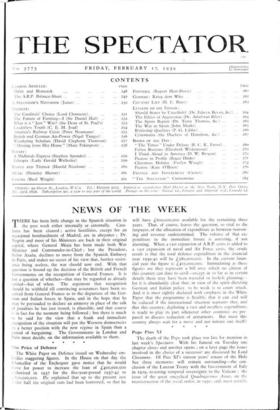he Price of Defence
The White Paper on Defence issued on Wednesday em- bodies staggering figures. In the House on that day the Chancellor of the Exchequer gave notice that he would move for power to increase the loan of £400,000,000 zthorised in 1937 for the five-year-period 1937-42 to 'too,000,000. He explained that up to the present just .:der half the original sum had been borrowed, so that he will have £600,000,000 available for the remaining three years. That, of course, leaves the question, so vital to the taxpayer, of the allocation of expenditure as between borrow- ing and revenue undetermined. The volume of that ex- penditure in the immediate future is arresting, if not alarming. When a vast expansion of A.R.P. costs is added to a vast expansion of naval and Air Force costs, the crude result is that the total defence expenditure in the tinancial year 1939-40 will be £580,000,000. In the current finan- cial year the figure is £405,000,000. Intimidating as these figures are they represent a bill over which no citizen of this country can dare to cavil—except in so far as in certain details there may have been wasteful or foolish planning— for it is abundantly clear that, in view of the spirit dictating German and Italian policy, to be weak is to court attack. And it is most rightly declared with emphasis in the White Paper that the programme is flexible, that it can and will be reduced if the international situation warrants that, and that this country, deploring a vast and needless expenditure, is ready to play its part whenever other countries are pre- pared to discuss reduction of armaments. But must this country always wait for a move and not initiate one itself?










































